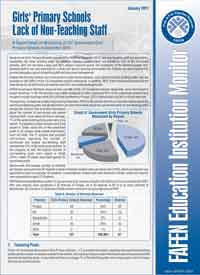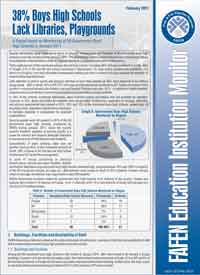FAFEN launches Health Scan, a monthly report based on number of reported cases of diseases at government-run healthcare facilities in 76 districts across country
One confirmed Polio case was reported in Pakistan’s largest metropolis, Karachi, in November 2010, indicating the persistence of the viral disease despite aggressive vaccination campaigns by the government since 1993 for its eradication.
According to data about the reported cases of diseases collected by FAFEN from EDO Health Offices in 76 districts across Pakistan in November 2010, one case of Polio was documented in Karachi, district of Sindh, while five cases of Probable Poliomyelitis were documented in two districts — one in Kamber-Shahdadkot district of Sindh and four in Haripur district of Khyber Pakhtunkhwa (KP).
Pakistan remains one of the four countries including India, Afghanistan, and Nigeria, where Polio is endemic. Health officials confirm that Pakistan is the only country where more Polio cases were recorded in 2010, increasing from 89 recorded in 2009 to 144 in 2010. While many reasons may be cited behind persistence of Polio in Pakistan, inadequate immunization coverage remains the primary cause that may leave many children out of the vaccination loop.
In addition to alarming number of Maternal, Infant and Child Mortality, a large number of Respiratory Tract Infections (RTIs), Gastro and Skin Infections were also reported during November, says FAFEN’s Health Scan report, launched here Monday.
FAFEN Governance Monitors collected data about the reported cases of diseases at government-run healthcare facilities from 76 EDO Health Offices nationwide during November 2010 — 30 in Punjab, 20 in Sindh, 16 in KP, seven in Balochistan, two in FATA, and one in ICT.
Besides Polio, Tuberculosis remains another disturbing disease with 28,128 confirmed and suspected cases being reported at government-run healthcare facilities in 76 districts across Pakistan only during November 2010. A majority of TB cases, 20,613, were recorded in Punjab, with the highest number of 5,918 reported in Rahimyar Khan district. It is important to note that according to the draft of the National Health Policy 2009, Pakistan is ranked sixth among the 22 high burden TB countries of the world.
In November 2010, 53% of all 1,767,722 reported cases of diseases documented at state-run healthcare facilities, as calculated in 76 districts countrywide, were due to Respiratory Tract Infections (RTIs). Gastrointestinal Infections constituted 20% of the total cases of diseases in November. These were categorized into Diarrhea and Dysentery (taken together), and Gastroenteritis. Skin Diseases (Scabies) made 13% of all reported cases of diseases in November. In this regard, Sindh was the most disease concentrated, with 115,599 cases observed out of a total 193,104 reported cases of Scabies.
Dengue was found to be rampant in Lahore district of Punjab, as 2,402 cases out of total 2,882 were reported. It is possible that the high number of cases is due to the turnover of patients from surrounding districts, as there is scarcity of specialized medical services in these areas. Overall, most cases of Hepatitis, 2,664, were reported from Punjab. Sindh region was the most affected by Malaria, as 113,381 cases out of a total 180,580 were reported in 20 districts monitored in Sindh. The high number of cases of Malaria can be attributed in part to the unhygienic and unsanitary living conditions prevailing due to the recent floods.
Interestingly, no cases of Suspected HIV/AIDS were reported in any part of the country. It merits investigation as to whether this is due to under reporting, since according to the draft of the National Health Policy 2009, evidence indicates increasing prevalence of HIV among certain sections of society, like Injecting Drug Users, making it a concentrated epidemic.
The district of Rahimyar Khan (Punjab) followed by Gujranwala (Punjab), Kasur (Punjab), Khairpur (Sindh), and Lahore (Punjab) were observed to be the most disease concentrated in November, 2010.
High numbers of Infant, Child and Maternal Mortality were reported in November 2010. In the 76 monitored districts, 145 mothers died due to pregnancy or delivery related complications. Alarming levels of Infant Mortality were also seen, as in one month alone, 1,138 infants died before the age of 12 months. A total of 130 children died before the age of five years in November in the government facilities in monitored districts.
FAFEN observers visited 82 districts in November to collect data from the EDO Health Offices. The EDO Health offices in six districts namely Mansehra (KP), Malakand (KP), Faisalabad (Punjab), Swabi (KP), Tank (KP) and Quetta (Balochistan) withheld this information from FAFEN monitors. All government departments are required to share information by law. Formal requests invoking Freedom of Information Laws are filed with the offices, which did not share this information.
About FAFEN:
FAFEN is a network of 35 civil society organizations working to foster democratic accountabilities in Pakistan. It is governed by Trust for Democratic Education and Accountability. For more information please visit www.fafen.org.



